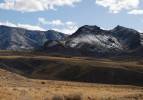Falling revenues shouldn’t undermine tax reform
There’s still gold in them there hills, but it’s just not worthwhile to dig it up.
That’s basically the reason Nevada’s general fund will see just $20 million this year from the net proceeds of the minerals tax, as opposed to an anticipated $46 million. The price of gold has fallen significantly from its heights during the recession, which makes it less lucrative for miners to go after harder-to-reach pockets of the metal.
Gold was selling for $1,294.50 per ounce on Tuesday, according to CNBC.com, much less than its high of more than $1,900 per ounce in 2011.
The state’s Economic Forum, a panel of experts that issues revenue projections used by state officials to build their budgets, had anticipated the net proceeds tax would generate about $94 million for state and local governments in the coming fiscal year. (Tax proceeds are divided roughly evenly between state government and local government where mining takes place.)
But, according to state officials, the actual total ended up being $79 million instead, with about $39 million owing to the state. And that’s before a credit of $19 million the state owes to the mining industry, which pre-paid some of its taxes in previous years to help state government through the recession.
Bottom line: Nevada gets just $20 million.
Although the mining industry has been careful not to say it out loud, it probably hopes voters take this economic news to heart and vote down Senate Joint Resolution 15, which will appear on November’s ballot as Question No. 2. That measure would remove the constitutional cap of 5 percent on the net proceeds of minerals from the state constitution.
The cap is somewhat deceiving, however: The mining industry gets to deduct a host of things before actually writing a tax check. The actual tax paid is less than 5 percent, and gold-producing mines avoid paying any taxes at all.
And while we know Nevada is one of the top gold-producing regions in the world, we also know that once that gold is gone, it’s gone for good. That means at some point in the future, depending on the price of gold, and the costs of extracting it, we may see the industry pull up stakes and leave the state forever, at which point we’ll be collecting nothing in taxes.
That’s why the news about falling gold prices shouldn’t stop you from voting for Question 2. Gold prices and production costs may not be favorable today, but the odds are they will be again at some point in the future. If we’d repealed the tax cap before the Great Recession, we’d have seen more revenue from the mining industry when the state needed it most.
After the original author of SJR 15, former state Sen. Sheila Leslie, D-Reno, lost election in 2012, some feared the departure from the Senate of one of mining’s few unabashed critics would end the matter for good. But Senate Republicans, led by Minority Leader Michael Roberson of Henderson and joined by Greg Brower, R-Reno (the man who defeated Leslie), rose up to ensure it would advance to the ballot. Roberson and a handful of allies even proposed a mining tax that would have taken effect right away if voters approved SJR 15, but that initiative failed to attract supporters.
While everybody in Nevada appreciates the good, high-paying jobs the industry provides, its charitable endeavors, as well as the other taxes it pays, the fact is what the state gets in taxes from companies that make billions of dollars on a nonrenewable resource buried under land we all supposedly own is a joke, and it has been since members of the mining industry wrote (and then re-wrote) the state constitution in 1864.
The price of gold always rises in perilous economic times. The fact that it’s falling is good news in the sense that the rest of the economy is recovering. But if that ever changes, Nevada shouldn’t be shortchanged. That’s why we need to pass Question 2 in November.
Steve Sebelius is a Las Vegas Review-Journal political columnist who blogs at SlashPolitics.com. Follow him on Twitter (@SteveSebelius) or reach him at 702-387-5276 or ssebelius@reviewjournal.com.























